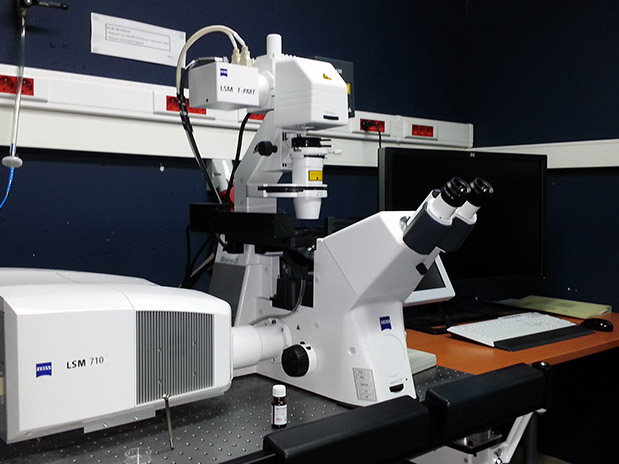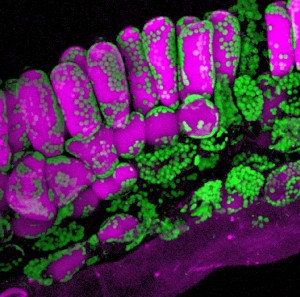 |
One or two-photon – many available variants |

|
Confocal laser scanning microscopes were the first to come along. These extremely versatile (and therefore indispensable) tools equip each light microscopy facility in the TRI network. They capture the fluorescent signal only from the focal plane by getting rid of the stray fluorescence from the upper and lower planes. The point-by-point laser illumination provides great flexibility in acquisition, including the ability to zoom in on the image until it reaches the limit of optical resolution (several dozen nanometers). However, this high-resolution ability implies a certain slowness, which can be overcome by confocal resonant scanning systems, more sensitive sensors or spinning disk-confocal systems.
Laser scanning microscopes can be seperated into two groups: one- and two-photon microscopes. The latter can penetrate deeper into matter and achieve a better resolution.

Violet leaf (limbe corneta) observed with a confocal microscope
Services :
- XYZT observation (multipositions) and in time
- Multi-labeled images
- UV lasers for nuclear labels (i.e. DAPI, Hoechst)
- Thermoregulation and CO2 control for sample maintenance
- Live or fixed samples
- Spectral analysis with nanometer precision
- Ultra-sensitive detectors (i.e. GAsP, hybrids)
- FRAP, fluorescence anisotropy measurements
- Image analysis and 3D reconstruction (Volocity, Metamorph, Imaris, Amira)
Access mode:
- With assistance
- In autonomy (after training)
- As collaborative project
One-photon confocal microscope
Name |
Characteristic techniques |
Location |
| LEICA SP2 | Upright microscope | CBI – UT3 Paul Sabatier |
| Zeiss 710 Big | Inverted (microscope), UV laser, multi-positions, Thermoregulated and CO2 controlled chamber, GAsP | CBI – UT3 Paul Sabatier |
| Leica SP8 resonant | Inverted (microscope), UV laser, multi-positions, hybrid detector | CBI – UT3 Paul Sabatier |
| Leica SP8 resonant | Upright microscope, multi-positions, hybrid detector | CBI – UT3 Paul Sabatier |
| LEICA SP8 | Inverted (microscope), UV laser, multi-positions | Infinity – CHU Purpan |
| Zeiss 510 inv | Inverted (microscope) | Infinity – CHU Purpan |
| Zeiss 710 inv | Inverted (microscope), UV laser | Infinity – CHU Purpan |
| ZEISS LSM780 | Thermoregulation & CO2 control, GAsP | I2MC – CHU Rangueil |
| Zeiss LSM510 | Inverted (microscope), thermoregulation & CO2 control, multi-positions | I2MC – CHU Rangueil |
| LEICA SP2 AOBS | Upright microscope, UV laser | FR3450 – Campus INRA Auzeville |
| LEICA SP8 | Upright microscope, UV laser, multi-positions, hybrid detector | FR3450 – Campus INRA Auzeville |
| LEICA SP8-2017 | Upright microscope, UV laser, multi-positions | FR3450 – Campus INRA Auzeville |
| TIRF OLYMPUS FV1000 | Inverted (microscope), thermoregulation & CO2 control, UV laser | IPBS – Rangueil |
| Zeiss LSM 880 | Upright, spectral analysis, multi-positions, mono or bi-photon, thermorégulation | Restore – Oncopôle |
Two-photons confocal microscope
Name |
Characteristic techniques |
Location |
| LEICA SP5 | Upright microscope, multi-positions | CBI – UT3 Paul Sabatier |
| Zeiss 7MP | Upright microscope | Infinity – CHU Purpan |
| MP DIVE | Upright microscope, thermoregulated, FLIM, Mosaics, multi-position, spectral (excitation & emission), time series | IPBS – Rangueil |
| FLIM LSM710 | Inverted microscope, thermoregulated and CO2 controlled chamber, FLIM | IPBS – Rangueil |
| Lavision Biotech | Upright & inverted microscope, thermoregulated, Biosecurity level / BSL3 – More | IPBS – Rangueil |
| Bruker 2P+ | Upright, resonant scanner, Z-piezo, multi-positions | Infinity – CHU Purpan |
| Zeiss LSM 880 | Upright, spectral analysis, multi-positions, mono or bi-photon, thermorégulation | Restore – Oncopôle |
Some publications made thanks to these resources:
- Barlerin D, Bessière G, Domingues J, Schuette M, Feuillet C, Peixoto A. Biosafety Level 3 setup for multiphoton microscopy in vivo – 2017 Sci Rep. 2017 Apr 3;7(1):571. Download
- I. El Mourdi, A. Canivet, N.T. Joncker, E. Bellard & S. Allart. High Accuracy 4D Cell Tracking Into Explanted Skin Using Two-Photon Excitation Microscopy – Microscopy research and technique. 2015
- High Accuracy 4D Cell Tracking Into Explanted Skin Using Two-Photon Excitation Microscopy El Mourdi, A. Canivet, N.T. Joncker, E. Bellard, S. Allart. Microscopy Research and Technique, 2015
- Labernadie A, Bouissou A, Delobelle P, Balor S, Voituriez R, Proag A, Fourquaux I, Thibault C, Vieu C, Poincloux R*, Charrière GM*, Maridonneau-Parini I*. Protrusion force microscopy reveals oscillatory force generation and mechanosensing activity of human macrophage podosomes. Nat Commun. 2014
- Vérollet C, Souriant S, Bonnaud E, Jolicoeur P, Raynaud-Messina B, Kinnaer C, Fourquaux I, Imle A, Benichou S, Fackler OT, Poincloux R, Maridonneau-Parini I. HIV-1 reprograms the migration of macrophages. Blood. 2014
- Gouzy A, Larrouy-Maumus G, Bottai D, Levillain F, Dumas A, Wallach JB, Caire-Brandli I, de Chastellier C, Wu TD, Poincloux R, Brosch R, Guerquin-Kern JL, Schnappinger D, Sório de Carvalho LP, Poquet Y, Neyrolles O. Mycobacterium tuberculosis Exploits Asparagine to Assimilate Nitrogen and Resist Acid Stress during Infection. PLoS Pathog. 2014


